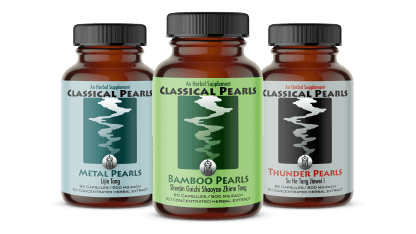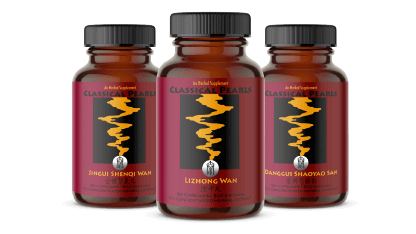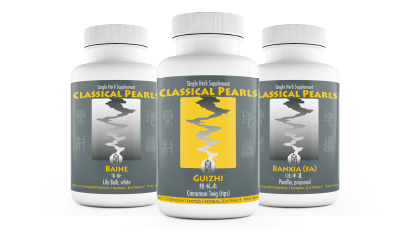About Jingui Shenqi Wan
Shenqi Wan was first mentioned 1,850 years ago in five different chapters of Zhang Zhongjing’s classical formula primer for complex disorders, Essentials from the Golden Cabinet (Jingui yaolüe). It is often cited as a prime example for the precise and symmetrical design of classical prescriptions: 3 herbs are intended to tonify the body’s physical essences, namely the yin of Kidney, Spleen and Liver; while 3 herbs prevent pathological yin excess (stagnating water, phlegm, and Blood heat) in the same organ systems. Two pungent ingredients, namely cinnamon and aconite in comparatively small amounts, strengthen functional energy by warming mingmen fire and prevent the rather sticky yin herbs from becoming an undue burden to the digestive system. In this manner, Shenqi Wan not only addresses issues of deficiency and excess in the core organs of the middle and lower burners, but fortifies both the original yin and yang. While the formula’s derivative Liuwei Dihuang Wan (Six Ingredient Pill with Rehmannia) is widely regarded as the representative remedy for tonification of Kidney yin, Shenqi Wan specifically tonifies Kidney qi—the fundamental force behind life’s rhythms of growing, aging and sexual maturity, which is produced by the constant interaction of the Kidney’s original yin and original yang. While Shenqi Wan and its variant Liuwei Dihuang Wan tend to be overprescribed in modern Chinese herbalism (chronic exhaustion disorders in contemporary patients tend to primarily involve Spleen and Liver imbalances), the remedy constitutes one of the fundamental paths for addressing chronic Kidney issues and thus covers a wide range of pathologies. The name Jingui Shenqi Wan underscores that the remedy was prepared in the classical way, using raw rehmannia and cinnamon twig (rather than the later variation of cooked rehmannia and cinnamon bark).
Therapeutic Principles
- Tonify Kidney qi
- Enhance water metabolism
Formula Ingredients
| CHINESE | PINYIN | COMMON NAME; PAOZHI (PROCESSING) | AMOUNT |
| 生地黃 | Sheng Dihuang | Rehmannia, raw | 29.63% |
| 山藥 | Shanyao | Dioscorea | 14.81% |
| 山茱萸 (酒蒸) | Shanzhuyu | Cornus; wine treated | 14.81% |
| 澤瀉 | Zexie | Alisma | 11.11% |
| 茯苓 | Fuling | Poria | 11.11% |
| 牡丹皮 | Mudanpi | Moutan | 11.11% |
| 桂枝 (尖) | Guizhi | Cinnamon twig | 3.70% |
| 附子 (竹刀削, 蒸制) | Fuzi | Aconite; peeled w/ bamboo knife, steam cured | 3.70% |
Jingui Shenqi Wan Usage
Companion Remedies
SUITABLE FOR COMBINING
Similar Remedies
ALSO CONSOLIDATE KIDNEY QI WITH REHMANNIA; ALTERNATION OPTIONS
| HERITAGE SERIES | LEGACY SERIES |
| Shenxian Dushi Dan | Water Pearls |
| Shuyu Wan | Wind Pearls |
| Glacier Pearls |
Supplement Facts
- Serving size: 3 capsules
Servings per contains: 30
Amount per serving: 1500mg
*Proprietary blend containing pure herbal extracts of:
Rehmannia glutinosa root tuber (Sheng Dihuang), Dioscorea oppositifolia rhizome (Shanyao), Cornus officinalis fruit (Shanzhuyu), Wolfiporia cocos sclerotium (Fuling), Paeonia suffruticosa root bark (Mudanpi), Alisma plantago-aquatica rhizome (Zexie), Cinnamomum loureirii twig (Guizhi), Aconitum carmichaelii lateral root cured (Fuzi)
* % Daily value not established
Other ingredients: living green clay excipient, vegetable capsule






